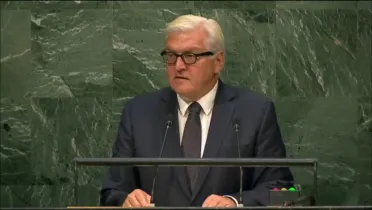Statement
Statement summary
FRANK-WALTER STEINMEIER, Minister for Foreign Affairs of Germany, said that if the world had indeed become a village in the age of globalization, then “we are all neighbours”. Nobody was investing so much hope in that spirit today as the millions of women, men and children who had fled their homes. His country had, since the start of the year, taken in 600,000 refugees and continued to do so daily. Yet, his country could not shoulder the issue alone in the long-term. “We need a European solution”, he urged, one built on close cooperation with neighbours around the Mediterranean, especially Turkey. It was “scandalous” that United Nations relief agencies, such as the Office of the United Nations High Commissioner for Refugees (UNHCR) and the World Food Programme (WFP), were so underfunded and had to cut food rations and medical aid. He had met with the Group of Seven and other partners, and together they had raised an additional $1.8 billion — of which over $100 million came from Germany — for the Organization’s relief agencies.
Noting that good neighbourliness presupposed respect for each other’s borders and sovereignty, he said that a fundamental norm was being violated by the Russian Federation’s annexation of the Crimea and its actions in eastern Ukraine. The European Union had launched a political process to defuse the conflict. In the interest of common security, his country wished to further strengthen the Organization for Security and Cooperation in Europe (OSCE) when it assumed its chairmanship in 2016. Noting that active political responsibility was also part of good neighbourliness, he recalled that this summer the Security Council’s five permanent members and Germany had concluded an agreement with Iran to ensure that it would never have an atomic bomb. They had also brought many actors, including the Russian Federation and the United States, to “sit at the same table”, proving that while neighbours may not like each other, they could still solve problems together.
Turning to Syria, he called for joint action to end “the brutality of Assad’s dictatorship” and to break the control of ISIL. Calling for a legitimate and responsive United Nations, he said his country would continue to support reform of the Organization and the Council, the 2030 Agenda, and climate change objectives. Humbled that the Charter was partly a response of humankind to the war and inhumanity that had originated in his country, he expressed gratitude for Germany’s gradual inclusion in the international community, pledging his countrymen’s commitment to be good neighbours.
Full statement
Read the full statement, in PDF format.
Photo

Previous sessions
Access the statements from previous sessions.
